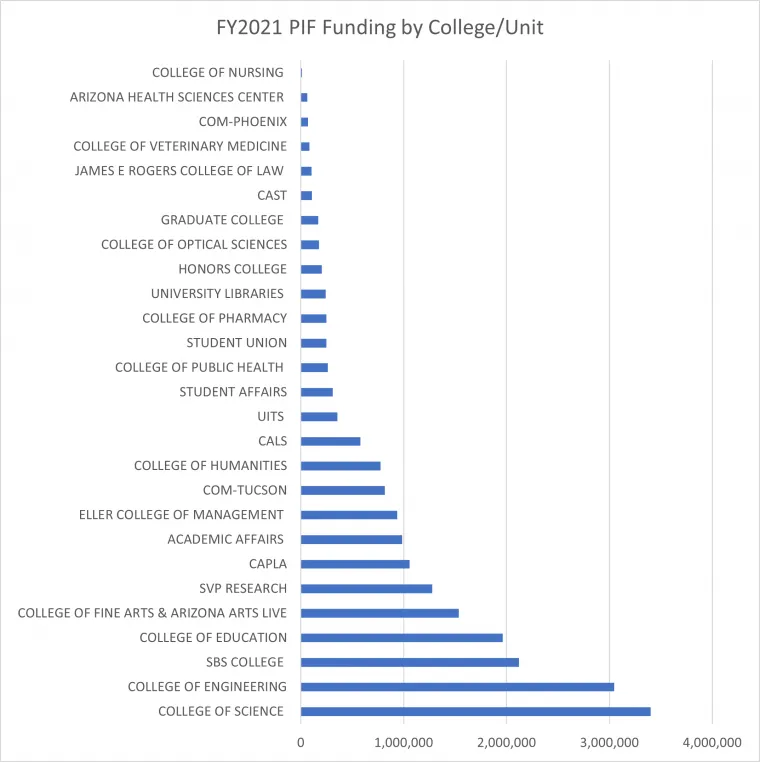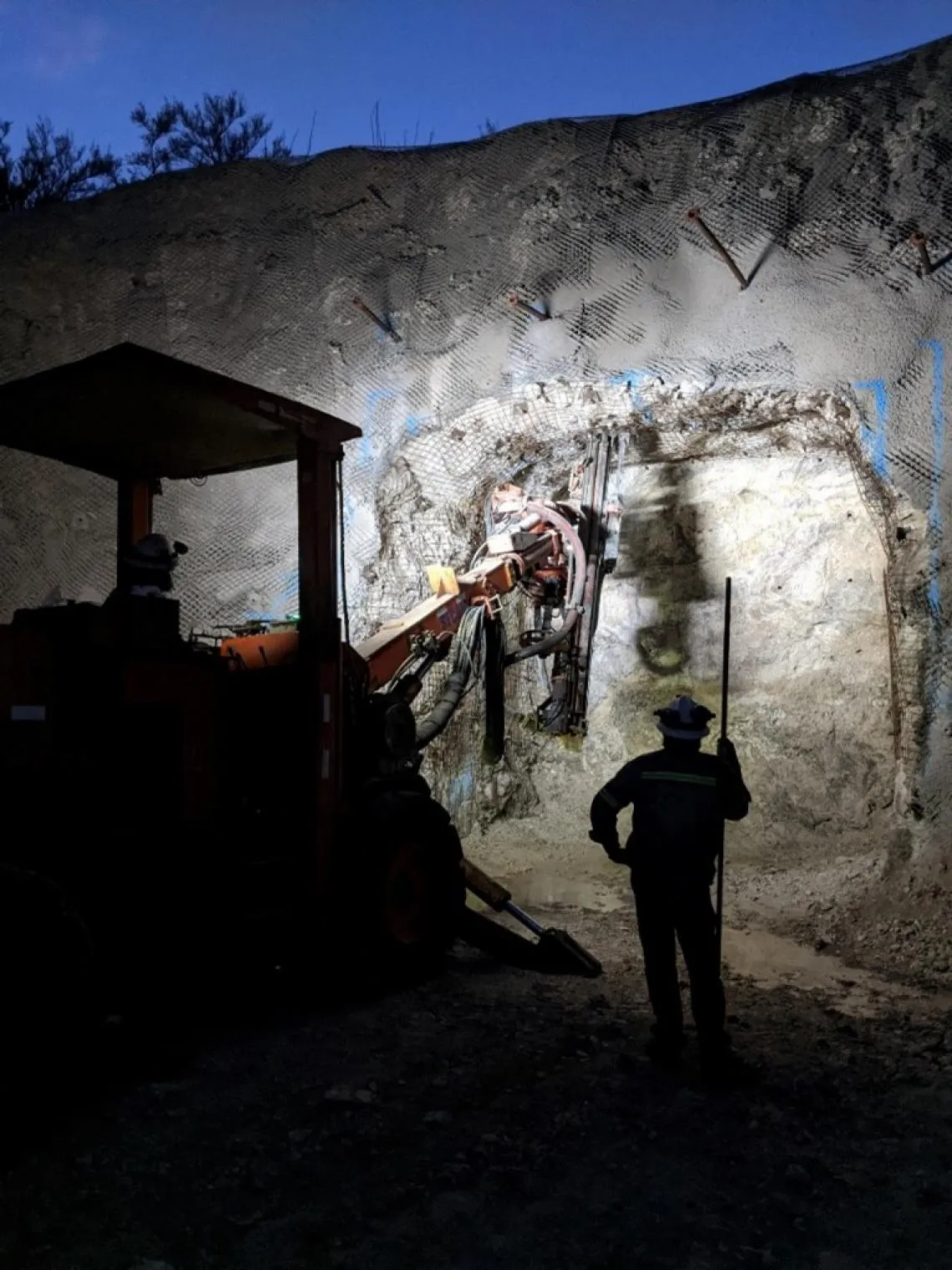FY2021 Provost's Investment Fund (PIF) Report
In Fiscal Year 2020-2021, the Office of the Provost received an allocation for $18,290,667 from the Responsibility Centered Management (RCM) budget model to fund the Provost’s Investment Fund (PIF). The Office of the Provost provided additional funding to PIF where a total of $22,499,160 was committed to the colleges and units. A total of $20,607,255 was allocated to operational initiatives listed in Table 1. Most of these operational initiatives are to fund strategic programs and initiatives requested of the Provost by deans/units leaders as well as to fund strategic programs such as Strategic Priorities Faculty Initiatives (SPFI), Faculty Salary Equity, Graduate Interdisciplinary Program (GIDP), Regents/Distinguished Professors, and faculty awards. A total of $1,891,905 was for strategic initiatives awarded through competitive submissions listed in Table 2. From these commitments, over $21 million (shown in the graph below) was transferred from PIF to colleges and units.

| CATEGORY | FY2021 | % |
|---|---|---|
| Deans & Dept Heads Administrative Stipends | 1,631,951 | 7.25% |
| Distinguished Professors | 117,280 | 0.52% |
| Enterprise Systems | 569,655 | 2.53% |
| Faculty Awards | 42,000 | 0.19% |
| Faculty Salary Support | 4,867,885 | 21.64% |
| Graduate Interdisciplinary Program (GIDP) Faculty Salary Support | 198,465 | 0.88% |
| Strategic Hiring Commitment/Start-up for Deans & Dept Heads | 4,122,125 | 18.32% |
| Instructional/Academic Support | 1,181,566 | 5.25% |
| Faculty Partner Hires | 1,225,741 | 5.45% |
| Promotion & Tenure Committee | 16,000 | 0.07% |
| Provost's Discretionary Support | 205,000 | 0.91% |
| Regents Professors Salary Support | 151,895 | 0.68% |
| Research Support | 1,396,160 | 6.21% |
| Faculty Retention | 280,086 | 1.24% |
| Faculty Retirement Buyout | 488,087 | 2.17% |
| Shared Governance Support | 48,550 | 0.22% |
| Strategic Priorities Faculty Initiative (SPFI) | 491,076 | 2.18% |
| Student Support | 235,108 | 1.04% |
| Technology Research Initiative Fund (TRIF) | 34,934 | 0.16% |
| TOTAL | 20,607,255 | 91.59% |
Table 1. Operational Initiatives
| CATEGORY | FY2020 | % |
|---|---|---|
| Instructional/Academic Support | 413,269 | 1.84% |
| Instructional/Research Facilities or Infrastructure | 87,000 | 0.39% |
| New Academic/Student Program | 1,114,036 | 4.95% |
| Research Support | 81,000 | 0.36% |
| Student Support | 196,600 | 0.87% |
| TOTAL | 1,891,905 | 8.41% |
Table 2. Strategic Initiatives Awarded Through Competitive Submissions
Highlights
The purpose of this summary is to highlight the progress of funded projects over a multi-year funding period per the receipt of annual progress reports from those recipients. Annual project summaries are required to meet accountability and transparency expectations and are valuable to highlight milestones and accomplishments achieved by the programs/projects funded by PIF.
San Xavier Underground Mining Laboratory
The Department of Mining and Geological Engineering in the College of Engineering was awarded $174,000, which have been invested in the San Xavier Mining Laboratory, to begin transforming it into a world class underground mining technology center. Development of underground entries for larger autonomous equipment has been accomplished by creation of new underground workings. As of late, a portal and 390 feet of decline have been established and stabilized, with 1,200 feet still in the works. This project stemmed from demand to develop advanced technology to remove people from high hazard environments and to automate more tasks. By creation of larger tunnels, more of the underground environment can be utilized, surveyed, and autonomous sensing and communication technologies can be tested.
This expansion allows the University of Arizona to expand our education and training offerings not only to our population but to community college, high school students in the JTED program, government and industry professionals as well. James Werner, Assistant Director, San Xavier Mine and Project Lead said that,
“The project would benefit our existing partners in the College of Engineering as well as Science, CALS, Public Health, and expand to others. With a research- centric approach, students also have the opportunity to enroll in a wide variety of classes, workshops, directed research, independent study, and training opportunities that use competency models and hands- on experience, thus driving Institutional Excellence.”
A direct result of this project is the San Xavier Mining Laboratory now has the capability to serve as an international test bed for equipment and technology in the mineral industry.

Development of One Health Undergraduate Program with a Global Reach
The Environmental Health Sciences program in the Mel and Enid Zuckerman College of Public Health (MEZCOPH) was awarded $157,000. The initiative, led by Dr. Aminata Kilungo, has utilized the fund to develop and launch One Health, a minor, an undergraduate certificate, and a graduate certificate. Collaborations with partners are underway to increase global reach including a summer training program. One Health is a relatively new academic discipline that has been recognized worldwide to understand and address global challenges related to health.
The expansion of the One Health program to include trainings and workshops is aligned with the MEZCOPH mission in service-learning and to the 2016 Council on Education for Public Health’s (CEPH) accreditation criteria associated with providing students with an “ecological perspective on the connections among human health, animal health, and ecosystem health”. The initiative has established the University of Arizona as a distinct leader in both multidisciplinary, interprofessional, education and research. A focus on global partnership building and a multipronged learning strategy will ensure the availability of a workforce that is prepared and equipped to address present challenges at the transect of humans, animals, and the environment.
All four programs have been approved by the University of Arizona and have been officially launched in fall 2021, although some courses were taught as early as fall 2020. The graduate and undergraduate certificates are offered through main campus, Arizona Online, and the Global campus to ensure reach to the global community.
Undergraduate Degree in Emergency Medical Services
The Undergraduate Degree Program in Emergency Medical Services was awarded $292,463. The goal of this project was to develop and implement a B.S in Emergency Medical Services (EMS), enroll enough students in the program to make it sustainable, and graduate students who can obtain jobs in the competitive prehospital workforce. During the first year of funding, the program led by Joshua B. Gaither, MD, FACEP surpassed the project goals by enrolling more students in the EMS Major and Minor. The program also exceeded the project expectations by graduating its first students from the program. For Fiscal Year 2022, the program is excited to move into an academic year with the goals to continue to grow enrollment and offer new courses. The students also want to learn how to be part of the fight against COVID-19. The degree programs offer the opportunity for students to not only learn the skills they need to provide healthcare to individuals with COVID-19 but also the skills to manage similar events in the future. As such the program hopes to capitalize on this new interest while remaining true to the program goals of driving student success.
Updated at 8:00 a.m. September 7, 2021

